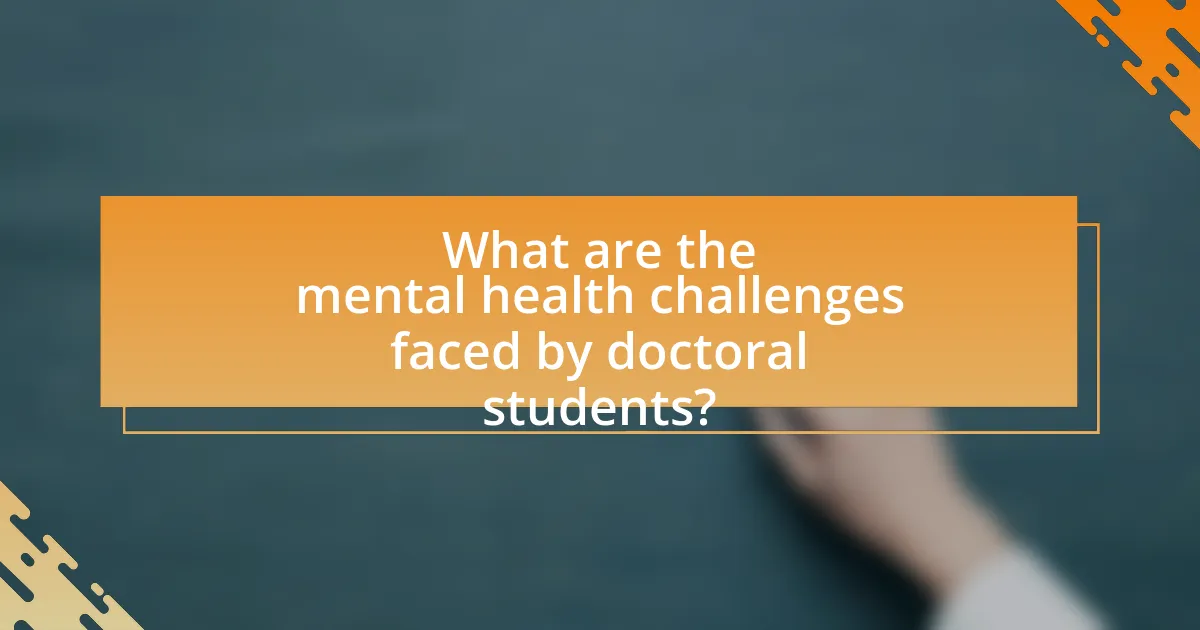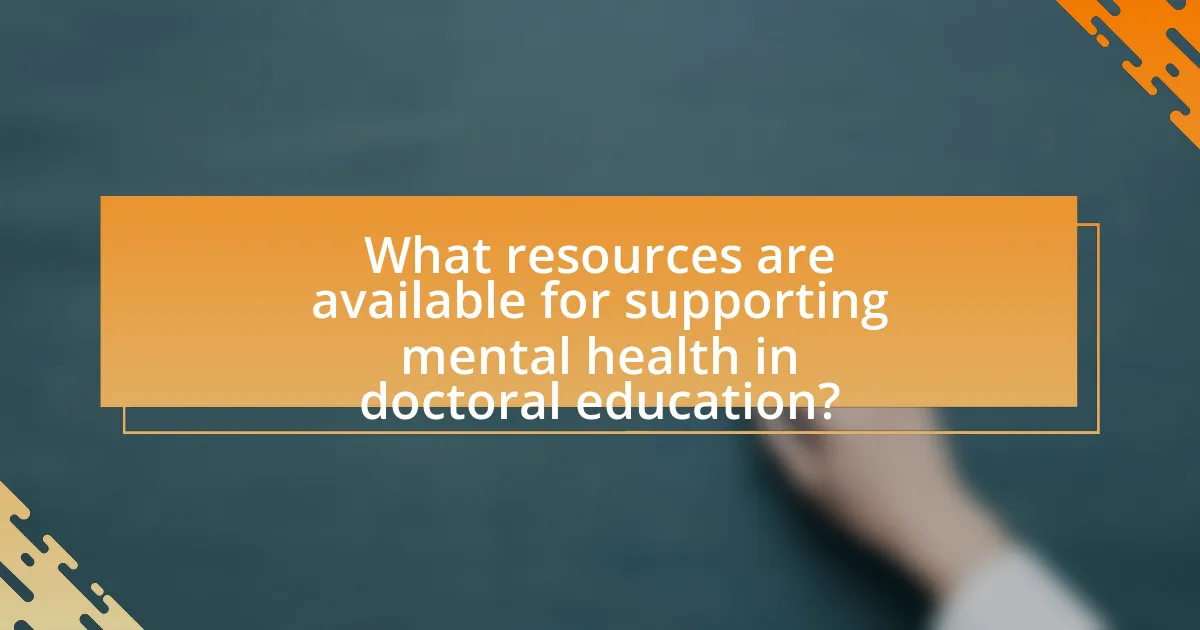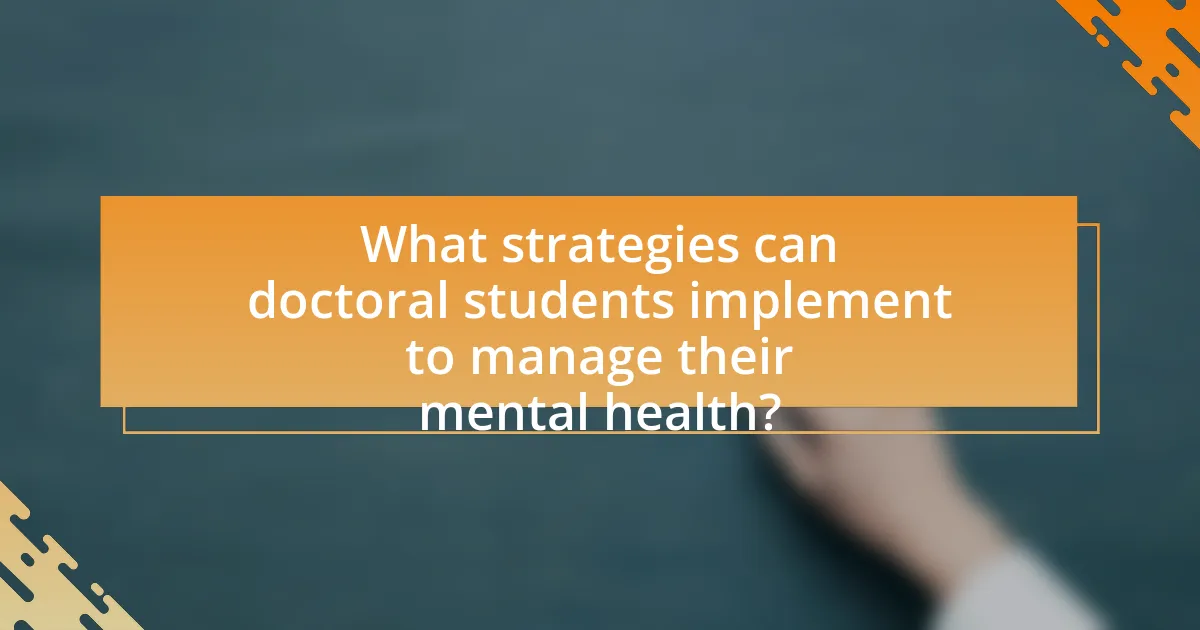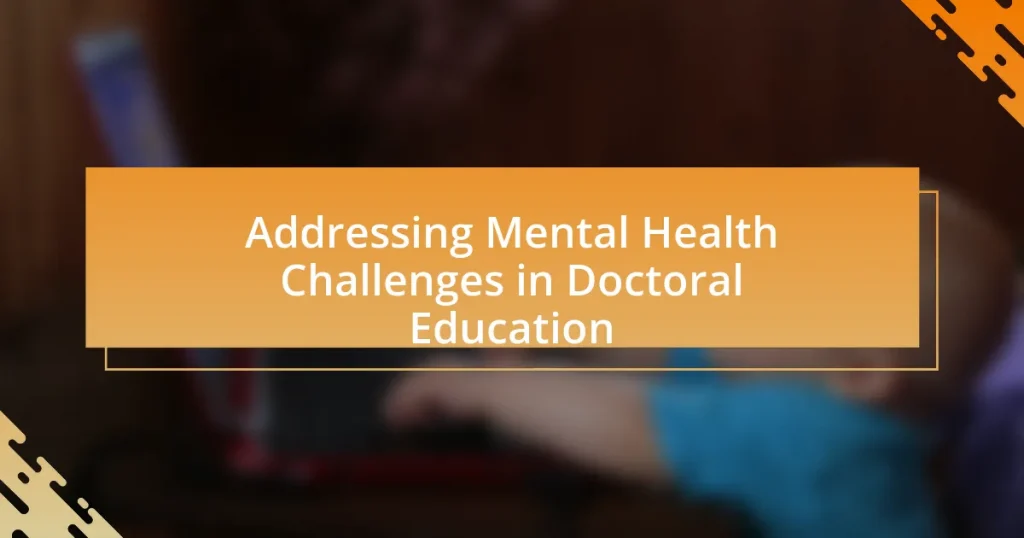The article addresses the mental health challenges faced by doctoral students, highlighting issues such as anxiety, depression, and stress, which affect approximately 40% and 30% of this population, respectively. It examines the impact of academic pressures, isolation, financial strain, and work-life balance on students’ mental well-being, emphasizing the need for supportive networks and resources. The article also discusses the importance of addressing these mental health issues to improve academic performance and overall quality of life, while outlining available support services and strategies for students to manage their mental health effectively.

What are the mental health challenges faced by doctoral students?
Doctoral students face significant mental health challenges, including anxiety, depression, and stress. Research indicates that approximately 40% of doctoral students experience anxiety, while around 30% report symptoms of depression, often exacerbated by high academic expectations, isolation, and pressure to publish. These factors contribute to a detrimental impact on their overall well-being and academic performance, as highlighted in a study published in the journal “Nature Biotechnology,” which surveyed over 3,500 graduate students and found that mental health issues are prevalent in this population.
How do academic pressures contribute to mental health issues?
Academic pressures significantly contribute to mental health issues by creating high levels of stress, anxiety, and depression among students. The demanding nature of doctoral education, characterized by rigorous coursework, research expectations, and the pressure to publish, can lead to feelings of inadequacy and burnout. Research indicates that approximately 40% of doctoral students experience psychological distress, with factors such as isolation, financial strain, and the competitive environment exacerbating these mental health challenges. A study published in the journal “Nature Biotechnology” by Levecque et al. (2017) found that 32% of PhD candidates reported experiencing severe anxiety, highlighting the correlation between academic demands and mental health deterioration.
What specific stressors are prevalent in doctoral education?
Specific stressors prevalent in doctoral education include academic pressure, isolation, financial strain, and work-life balance challenges. Academic pressure arises from high expectations for research output and performance, often leading to anxiety and burnout. Isolation is common due to the solitary nature of research work, which can contribute to feelings of loneliness and depression. Financial strain is a significant concern, as many doctoral students face limited funding and high tuition costs, impacting their mental well-being. Additionally, the struggle to maintain a healthy work-life balance can exacerbate stress, as students often find it difficult to manage their time effectively between academic responsibilities and personal life. These stressors are well-documented in studies, such as the one conducted by the Council of Graduate Schools, which highlights the mental health challenges faced by graduate students.
How do these stressors impact students’ mental well-being?
Stressors significantly impact students’ mental well-being by increasing anxiety, depression, and stress levels. Research indicates that high academic demands, financial pressures, and lack of support contribute to these mental health issues. For instance, a study published in the Journal of Affective Disorders found that 41% of graduate students reported experiencing anxiety and 39% reported depression, highlighting the prevalence of mental health challenges in this population. These stressors can lead to decreased academic performance, impaired social relationships, and overall diminished quality of life for students.
What role does isolation play in mental health challenges?
Isolation significantly exacerbates mental health challenges by increasing feelings of loneliness and depression. Research indicates that social isolation can lead to a 26% increase in the risk of premature death and is linked to higher rates of anxiety and mood disorders. In doctoral education, students often experience isolation due to intense academic pressures and limited social interactions, which can worsen their mental health. A study published in the Journal of Higher Education found that graduate students reported higher levels of stress and anxiety when they felt socially isolated, highlighting the critical need for supportive networks in academic environments.
How does the nature of doctoral work contribute to feelings of loneliness?
The nature of doctoral work contributes to feelings of loneliness primarily due to its isolating demands and the intense focus required for research. Doctoral candidates often spend long hours working independently on their projects, which can lead to social withdrawal and a lack of interaction with peers. Research indicates that 40% of doctoral students report feelings of isolation, stemming from the pressure to produce original work and the competitive environment of academia. This isolation is exacerbated by the limited opportunities for collaboration and the often solitary nature of research, which can hinder the development of supportive relationships.
What strategies can combat isolation among doctoral students?
To combat isolation among doctoral students, institutions can implement structured peer support programs. These programs facilitate regular interactions among students, fostering a sense of community and shared experience. Research indicates that social support significantly reduces feelings of isolation; for instance, a study published in the Journal of Higher Education found that students who participated in peer mentoring reported higher levels of satisfaction and lower levels of loneliness. Additionally, organizing group activities, workshops, and networking events can enhance social connections, further mitigating isolation.
Why is it important to address mental health in doctoral education?
Addressing mental health in doctoral education is crucial because it directly impacts students’ academic performance and overall well-being. Research indicates that doctoral students experience high levels of stress, anxiety, and depression, with studies showing that nearly 40% of PhD students report experiencing significant psychological distress. This distress can lead to decreased productivity, increased dropout rates, and long-term mental health issues. By prioritizing mental health support, institutions can foster a healthier academic environment, enhance student retention, and improve the quality of research output.
What are the long-term effects of unaddressed mental health issues?
Unaddressed mental health issues can lead to significant long-term effects, including chronic psychological disorders, impaired academic performance, and diminished quality of life. Individuals may experience persistent anxiety, depression, or other mental health conditions that can hinder their ability to function effectively in both personal and professional settings. Research indicates that untreated mental health problems can result in lower graduation rates among doctoral students, with studies showing that 30% of graduate students report experiencing severe anxiety or depression, which can ultimately affect their academic success and career trajectories. Additionally, unaddressed mental health issues can lead to increased rates of substance abuse, social isolation, and even suicidal ideation, further compounding the challenges faced by individuals in academic environments.
How can improved mental health support enhance academic success?
Improved mental health support enhances academic success by providing students with the necessary resources to manage stress, anxiety, and other mental health challenges that can impede their academic performance. Research indicates that students who receive adequate mental health support demonstrate higher levels of engagement, improved concentration, and better overall academic outcomes. For instance, a study published in the Journal of College Student Psychotherapy found that students who utilized counseling services reported significant improvements in their academic performance and overall well-being. This correlation underscores the importance of mental health resources in fostering an environment conducive to learning and achievement.

What resources are available for supporting mental health in doctoral education?
Resources available for supporting mental health in doctoral education include counseling services, peer support groups, mental health workshops, and online resources. Many universities offer dedicated counseling centers that provide individual therapy, group therapy, and crisis intervention specifically for graduate students. Peer support groups foster community and shared experiences, helping students cope with the unique pressures of doctoral studies. Mental health workshops often cover topics such as stress management, mindfulness, and resilience, equipping students with practical skills. Additionally, online platforms like the American Psychological Association provide resources and articles tailored to the mental health needs of graduate students, ensuring accessible support.
What types of mental health services do universities offer?
Universities offer a variety of mental health services, including counseling and psychological services, crisis intervention, workshops on stress management, and peer support programs. Counseling services typically provide individual therapy, group therapy, and psychiatric evaluations, which are essential for addressing students’ mental health needs. Crisis intervention services are available for immediate support during emergencies, ensuring that students receive timely assistance. Workshops on stress management and coping strategies help students develop skills to handle academic pressures. Additionally, peer support programs foster a sense of community and provide informal support among students, contributing to overall mental well-being. These services are crucial in addressing the mental health challenges faced by students in doctoral education, as evidenced by studies showing that mental health support significantly improves academic performance and student retention rates.
How can students access counseling and psychological services?
Students can access counseling and psychological services by contacting their institution’s mental health center or counseling office directly, either through phone, email, or in-person visits. Most universities provide a dedicated website with information on available services, appointment scheduling, and emergency contacts. For example, the American Psychological Association reports that 75% of college counseling centers offer same-day services for urgent mental health needs, ensuring students can receive timely support.
What role do peer support groups play in mental health support?
Peer support groups play a crucial role in mental health support by providing individuals with a safe space to share experiences and receive emotional validation. These groups foster a sense of belonging and reduce feelings of isolation, which are common in mental health struggles. Research indicates that participation in peer support groups can lead to improved mental health outcomes, such as reduced symptoms of anxiety and depression, as evidenced by a study published in the Journal of Affective Disorders, which found that individuals who engaged in peer support reported a 30% decrease in depressive symptoms over six months. Additionally, peer support groups facilitate the exchange of coping strategies and resources, enhancing individuals’ ability to manage their mental health effectively.
How can faculty and advisors support doctoral students’ mental health?
Faculty and advisors can support doctoral students’ mental health by fostering open communication and providing resources for mental health services. Establishing a supportive environment encourages students to discuss their challenges, which can reduce feelings of isolation and anxiety. Research indicates that mentorship and regular check-ins can significantly improve students’ well-being, as highlighted in the study “The Role of Faculty in Supporting Graduate Student Mental Health” published in the Journal of Graduate Education Research. This study shows that faculty engagement correlates with lower stress levels among doctoral students, emphasizing the importance of proactive support systems.
What training can faculty receive to better assist students?
Faculty can receive training in mental health awareness and intervention strategies to better assist students. This training can include workshops on recognizing signs of mental health issues, understanding the impact of stress and anxiety on academic performance, and learning effective communication techniques to support students in distress. Research indicates that faculty who are trained in these areas can significantly improve student outcomes, as they are better equipped to identify and refer students to appropriate mental health resources, thereby fostering a supportive educational environment.
How can open communication improve student-faculty relationships?
Open communication can significantly enhance student-faculty relationships by fostering trust and understanding. When students feel comfortable expressing their thoughts and concerns, faculty can better address individual needs and provide tailored support, which is crucial in the context of mental health challenges in doctoral education. Research indicates that open dialogue leads to increased student satisfaction and engagement, as it allows for the identification of issues before they escalate. For instance, a study published in the Journal of Higher Education found that institutions with strong communication practices reported higher levels of student well-being and academic success. This evidence underscores the importance of open communication in creating a supportive educational environment.
What external resources can doctoral students utilize?
Doctoral students can utilize various external resources such as counseling services, academic support centers, peer support groups, and online mental health platforms. Counseling services provide professional mental health support, which is crucial for managing stress and anxiety commonly experienced during doctoral studies. Academic support centers offer tutoring and workshops that help students improve their research and writing skills, reducing academic pressure. Peer support groups create a community where students can share experiences and coping strategies, fostering a sense of belonging. Online mental health platforms, like BetterHelp or Talkspace, offer accessible therapy options, allowing students to seek help conveniently. These resources collectively contribute to addressing mental health challenges faced by doctoral students.
Which organizations provide mental health resources specifically for students?
Organizations that provide mental health resources specifically for students include the American Psychological Association (APA), the National Alliance on Mental Illness (NAMI), and the Jed Foundation. The APA offers resources and guidelines for mental health support in educational settings, while NAMI provides educational materials and support networks for students facing mental health challenges. The Jed Foundation focuses on promoting emotional health and preventing suicide among college students through various programs and initiatives. These organizations are recognized for their commitment to enhancing mental health awareness and support for students in academic environments.
How can online platforms support mental health awareness and resources?
Online platforms can support mental health awareness and resources by providing accessible information, community support, and professional services. These platforms can host educational content, such as articles, videos, and webinars, that inform users about mental health issues, coping strategies, and available resources. For instance, the National Institute of Mental Health reports that online resources can reach a wider audience, particularly among students who may feel isolated. Additionally, online forums and social media groups can foster peer support, allowing individuals to share experiences and coping mechanisms. Furthermore, platforms can connect users with licensed mental health professionals through teletherapy services, making mental health care more accessible. According to a study published in the Journal of Medical Internet Research, teletherapy has been shown to be effective in improving mental health outcomes, particularly for those in academic settings.

What strategies can doctoral students implement to manage their mental health?
Doctoral students can implement several strategies to manage their mental health effectively. These strategies include establishing a structured routine, seeking social support, practicing mindfulness and stress-reduction techniques, and utilizing university mental health resources. Research indicates that maintaining a consistent daily schedule can enhance productivity and reduce anxiety, as it provides a sense of control and predictability. Additionally, studies show that social support networks, including peers and mentors, significantly contribute to emotional well-being by offering encouragement and reducing feelings of isolation. Mindfulness practices, such as meditation and deep-breathing exercises, have been proven to lower stress levels and improve focus, which is crucial during demanding academic periods. Furthermore, many universities offer counseling services and workshops aimed at promoting mental health, which doctoral students should actively utilize to access professional support.
How can time management improve mental health outcomes?
Effective time management can significantly improve mental health outcomes by reducing stress and enhancing productivity. When individuals prioritize tasks and allocate time efficiently, they experience a sense of control over their responsibilities, which can lead to decreased anxiety levels. Research indicates that students who practice effective time management report lower levels of stress and higher academic performance, as evidenced by a study published in the Journal of Educational Psychology, which found that students with strong time management skills had better mental health and academic outcomes. By organizing their schedules and setting realistic goals, doctoral students can mitigate feelings of overwhelm, thereby fostering a healthier mental state.
What techniques can help students prioritize their tasks effectively?
Students can prioritize their tasks effectively by utilizing techniques such as the Eisenhower Matrix, time blocking, and the Pomodoro Technique. The Eisenhower Matrix helps students categorize tasks based on urgency and importance, allowing them to focus on what truly matters. Time blocking involves scheduling specific periods for different tasks, which enhances focus and reduces procrastination. The Pomodoro Technique encourages students to work in short, concentrated bursts followed by breaks, improving productivity and maintaining mental well-being. Research indicates that these methods can significantly reduce stress and enhance task management skills, contributing positively to students’ mental health in demanding academic environments.
How does setting realistic goals contribute to mental well-being?
Setting realistic goals significantly contributes to mental well-being by providing individuals with a clear sense of direction and achievable milestones. When goals are realistic, they reduce feelings of overwhelm and anxiety, allowing individuals to experience a sense of accomplishment as they progress. Research indicates that setting specific, attainable goals can enhance motivation and self-efficacy, which are crucial for maintaining mental health. For instance, a study published in the Journal of Counseling Psychology found that individuals who set realistic goals reported lower levels of stress and higher levels of life satisfaction. This evidence supports the notion that realistic goal-setting is a vital strategy for promoting mental well-being, particularly in high-pressure environments like doctoral education.
What self-care practices are beneficial for doctoral students?
Self-care practices beneficial for doctoral students include regular physical exercise, mindfulness meditation, and establishing a balanced work-life schedule. Engaging in physical exercise has been shown to reduce stress and improve mood, which is crucial for students facing the pressures of doctoral studies. Mindfulness meditation can enhance focus and emotional regulation, helping students manage anxiety and maintain mental clarity. Additionally, creating a balanced work-life schedule allows doctoral students to allocate time for personal interests and social interactions, which are essential for mental well-being. Research indicates that these practices contribute to improved academic performance and overall mental health in graduate education contexts.
How can physical activity impact mental health positively?
Physical activity can positively impact mental health by reducing symptoms of anxiety and depression. Engaging in regular exercise stimulates the production of endorphins, which are chemicals in the brain that act as natural mood lifters. Research published in the Journal of Clinical Psychiatry indicates that individuals who participate in physical activity experience a significant decrease in depressive symptoms, with a meta-analysis showing that exercise can be as effective as antidepressant medications for some individuals. Additionally, physical activity enhances cognitive function and promotes better sleep, both of which contribute to improved mental well-being.
What role does mindfulness play in managing stress?
Mindfulness plays a crucial role in managing stress by promoting present-moment awareness and reducing anxiety. Research indicates that mindfulness practices, such as meditation and focused breathing, can lower cortisol levels, which are associated with stress. A study published in the journal “Psychological Science” by Zeidan et al. (2010) found that just a few sessions of mindfulness meditation significantly improved participants’ ability to manage stress and enhanced their cognitive flexibility. This evidence supports the effectiveness of mindfulness as a tool for stress management, particularly in high-pressure environments like doctoral education.
What are the best practices for seeking help when needed?
The best practices for seeking help when needed include recognizing the signs of distress, identifying appropriate resources, and initiating contact with support services. Recognizing signs such as prolonged stress, anxiety, or feelings of isolation is crucial for doctoral students to understand when they need assistance. Identifying resources like university counseling centers, peer support groups, or mental health hotlines provides specific avenues for help. Initiating contact can involve reaching out via email, phone, or in-person visits, which has been shown to increase the likelihood of receiving timely support. Research indicates that students who actively seek help report improved mental health outcomes, highlighting the effectiveness of these practices in addressing mental health challenges in doctoral education.
How can students identify when they need professional support?
Students can identify when they need professional support by recognizing persistent feelings of distress, anxiety, or depression that interfere with their academic performance and daily life. Signs include difficulty concentrating, changes in sleep or appetite, withdrawal from social activities, and feelings of hopelessness. Research indicates that approximately 30% of graduate students experience significant mental health issues, highlighting the importance of seeking help when these symptoms arise.
What steps should students take to reach out for help?
Students should first identify the specific type of help they need, whether academic, emotional, or mental health support. Next, they should reach out to appropriate resources, such as academic advisors, counseling services, or support groups available at their institution. It is important for students to communicate their concerns clearly and seek appointments or attend workshops that address their needs. Research indicates that early intervention and seeking help can significantly improve mental health outcomes, as highlighted in the study “Mental Health and Academic Performance in Doctoral Students” by Smith et al., published in the Journal of Higher Education.



